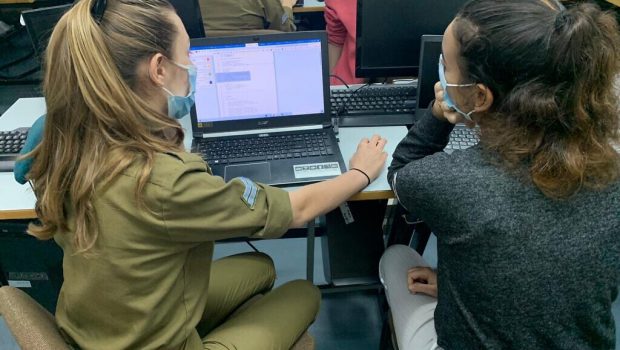Pre-IDF program seeking young women to train in cybersecurity skills
The Israel Defense Forces is seeking to attract more young women to a pre-enlistment program that focuses on cybersecurity training that they can use during their military service — and when they enter the job force in the years to come.
The pre-military program is under the purview of the IDF’s C4I and Cyber Defense Directorate, a branch responsible for communications and technology-related activities of IDF forces in the field and cybersecurity defense in the military. (C4I stands for command, control, communications, computers, and intelligence). The directorate answers to the Chief of Staff and works closely with the Operations Directorate, a branch tasked with planning the use of military force.
The C4I Directorate operates the Military School for Computer Science and Cyber Defense, which trains thousands of soldiers every year for various roles in the Air Force, Navy, and ground forces. The school offers training programs such as software development, data analytics, DevOps (software development combined with IT operations), and cyber defense, and is headed by Lieutenant Colonel Liat Litvak who took up the role this summer.
Litvak told The Times of Israel in a recent interview that these programs have historically drawn fewer young women than men, and the school is working to change this with a specialized pre-military program, or mechina in Hebrew.
“We have ‘open days’ where anyone can come in, get more information, sit down for a test, and if they pass, they can become candidates for the school. The test is for everyone and they don’t need any prior experience but fewer women usually come in for it,” she explained, which is why the school embarked on forming the preparatory mechina.
“We want to reach people of all backgrounds, educational and socioeconomic, and not just those who have computer science knowledge,” said Litvak.
Young women participate in a pre-military program to train them in software development and cybersecurity skills. (IDF)
Following a screening exam that tests for cognitive and mathematical abilities, the female candidates who are accepted begin the seven-week preparatory program during which they are taught skills such as the basics of programming, software development, and principles of cyber defense, as well as strategies like how to conduct advanced research and set professional and personal goals. There’s also an emphasis on personalized approaches and weekly sit-downs with instructors who closely follow the students’ progress and help them devise improvement plans.
“It is a huge learning experience for them where we provide them with the tools to take on the more rigorous and intense courses offered by the school,” Litvak said.
The 15-week cyber defense course, for example, where men and women study together, teaches more in-depth cybersecurity defense practices and skills as the students prepare for their army service. “There are cyber games and hackathons, and simulations on defending a smart city, for example, and all types of related activities,” Litvak said.
Currently, some 80 young women are enrolled in the 15-week preparatory program, offered in central and southern Israel.
Private L, who participated in the mechina and went on to complete a DevOps course, told The Times of Israel that the experience set her on a path she hadn’t previously realized could be possible.

A group of young women participate in a pre-military program to train them in software development and cybersecurity skills for their army service. (IDF)
“When I found out about the mechina, I didn’t know too much about it at first, but I was certainly happy for the opportunity to prove myself and to get into the pre-military courses I was not admitted to through traditional screening. The idea of taking a group of girls and getting the best out of them in the field of computers spoke to me very much and it gave me the motivation to continue down the road,” said Private L, whose full name can’t be disclosed as her military role is classified.
She said the preparatory program was a challenging but enriching experience. “I learned so much professionally and about the army in general. In addition, the program included various fascinating social activities such as workshops, lectures on female empowerment, personal development and more. Almost a year after graduating from the mechina, I can say that the skills I acquired still serve me in my military service today.”
L said the mechina gave her the opportunity to enlist in her preferred position in the IDF and gave her the required skills, such as independent learning and research, to do well.
Litvak said that the school’s measure for success is to “see more women go on to serve in key roles in the IDF” as well as in the tech industry in the future.
The initial results are encouraging. “In the last cyber defense course, 50 percent more women than men completed the program,” Litvak said, adding that she now sees about 40 percent more girls in the overall preparatory programs.
Israel’s cybersecurity sector
Israel is a leading player in the global cybersecurity industry, with many entrepreneurs in the field hailing from elite technological and intelligence units in the IDF.
The sector has drawn massive investments and interest in the past decade. Israel accounts for the second-largest number of cybersecurity deals globally, behind the US and ahead of the UK, according to a 2018 report New York data firm CB Insights.
In the first half of 2021 alone, Israeli cybersecurity companies raised $3.4 billion in 50 deals and seven of them became unicorns, or private companies valued at over $1 billion, the Israel National Cyber Directorate said in July.
The half-year figure accounted for 41% of the total funds raised by cybersecurity firms worldwide and was three times the amount raised in the same period a year earlier, the data showed.
More than a third of worldwide cybersecurity unicorns are Israelis, according to the report, with some 13 in Israel out of 30-33 globally, the directorate said.
Shoshanna Solomon contributed to this report.








Gloss